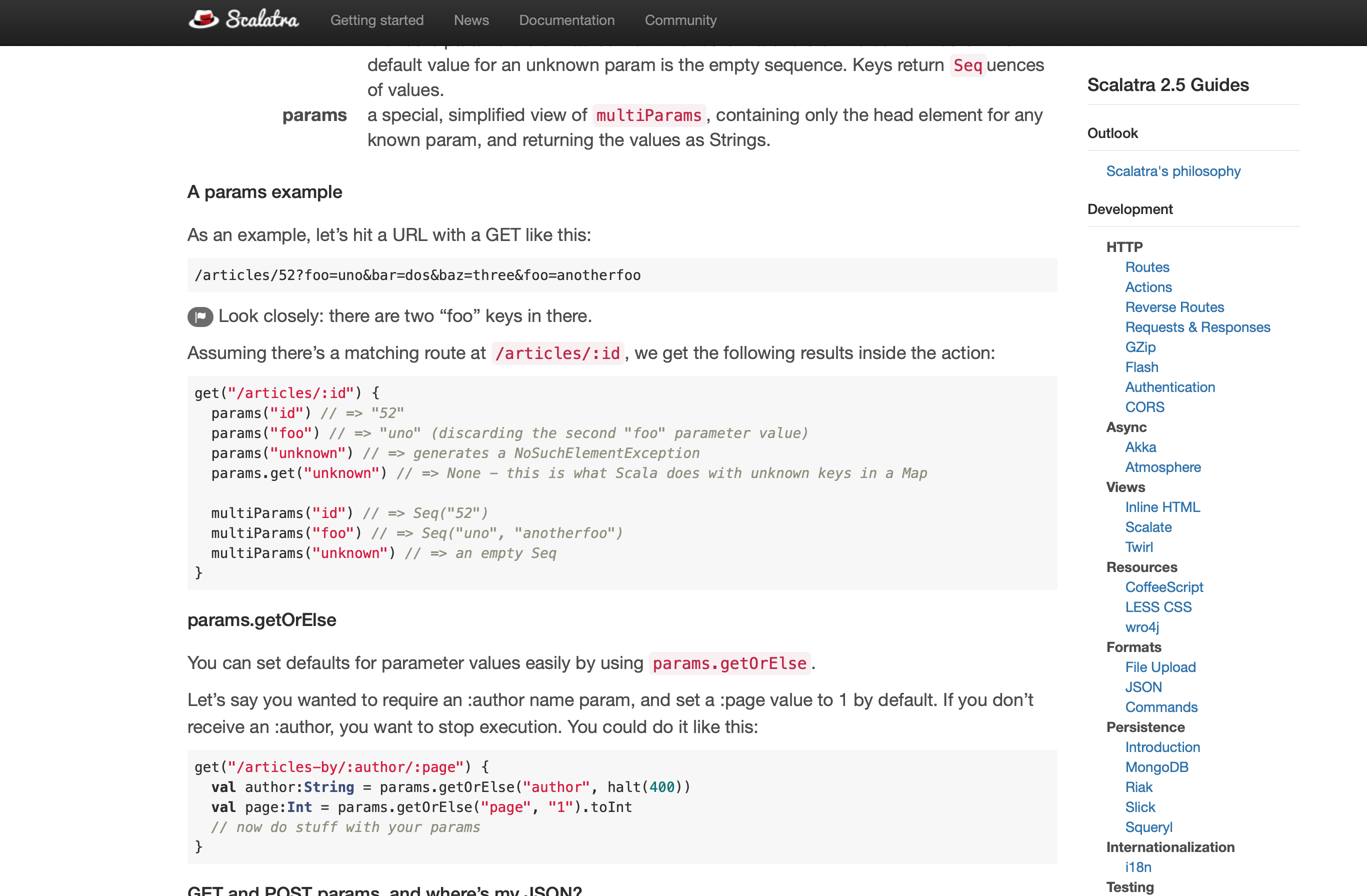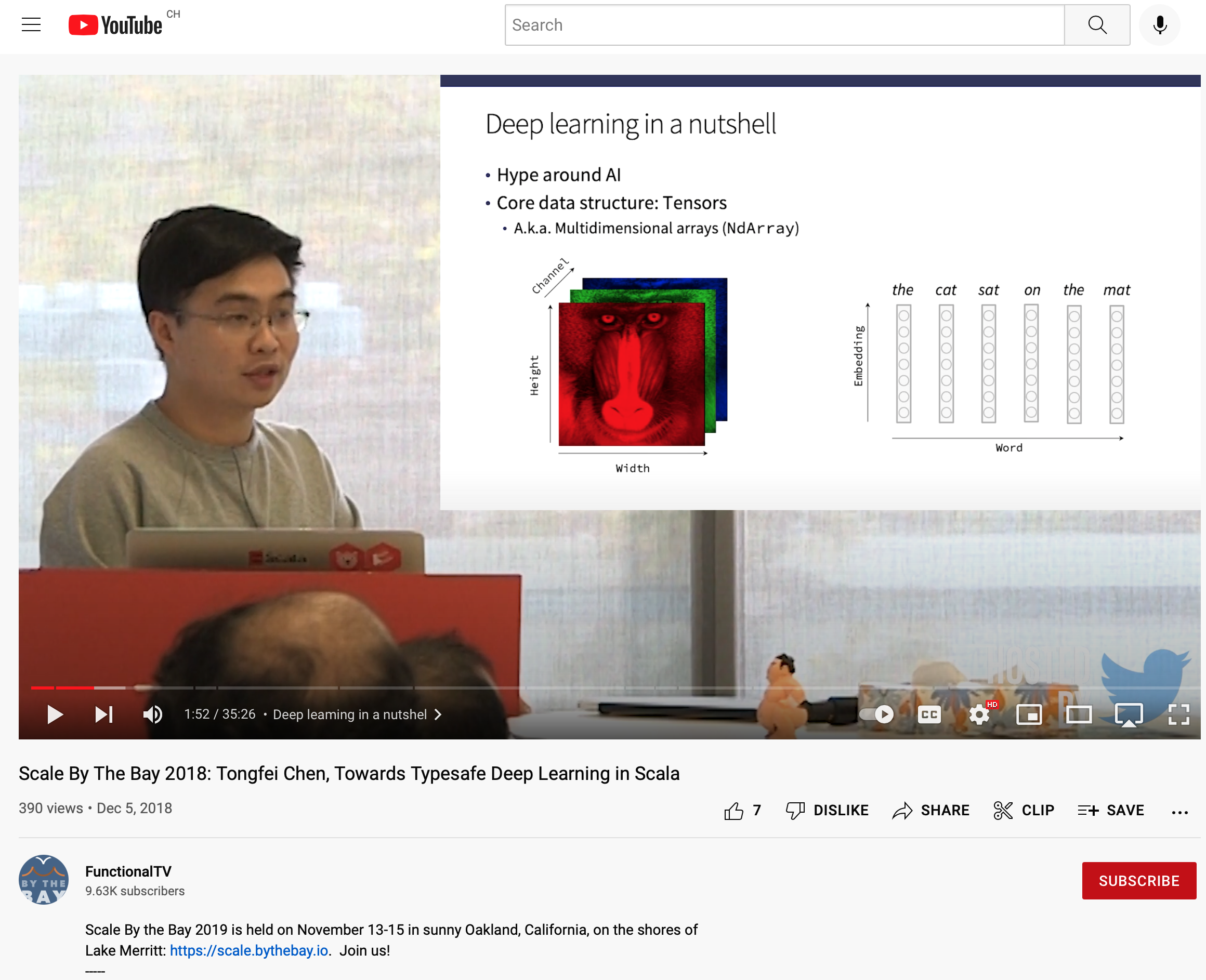Type-level Programming
in Scala
October 6, 2022
Introduction
Rockets explode
\gdef\tm#1{\textcolor{953800}{\texttt{{#1}}}} \gdef\tp#1{\textcolor{8250df}{\texttt{{#1}}}} \tm{x}
Types can help
\tm{x}:\tp{Long}
Literal types
Type inhabited by a single constant value known at compile-time:
val x: 3 = 3
val y: false = false
val z: "monday" = "monday"Path-dependent types
Type inhabited by a single non-necessary-constant term:
val a: Int = ???
val b: Int = ???
val c: a.type = a
val d: Int = a // Ok because (a: Int) <: Intval e: a.type = b // Error: found (b: Int)
// but required (a: Int)It is called path-dependent because it can refer to nested members as well:
object Foo:
val x: 3 = 3
summon[Foo.x.type =:= 3]Note: instances of the =:= type are generated automatically by the compiler when the left hand-side and the right hand-side are both subtypes of each other. Therefore, summon[X =:= Y] compiles only if X are equivalent Y.
Dependent parameters
Singletons are used to model equality between terms.
def same(a: Any, b: a.type) = ???
same(3, 3) // Ok
same(3, 4) // ErrorWriting the same function with a type parameter instead has a different meaning. It asks the compiler to find a T such that 3 <: T and 4 <: T which is satisfiable using T = Int:
def same2[T](a: T, b: T) = ???
same2(3, 4) // Ok; T is inferred to be IntDependent return types
def id(x: Any): x.type = xRefinement types
class Vec:
val size: Int
val v: Vec {val size: 2} = new Vec:
val size: 2 = 2
val vSize: 2 = v.sizeCompile-time operations
Simple bounded type aliases:
infix type +[X <: Int, Y <: Int] <: IntWith special compiler support for constant-folding:
import scala.compiletime.ops.int.+
val a: 2 + 2 = 4See Add primitive compiletime operations on singleton types #7628.
Match types
type IsEmpty[S <: String] <: Boolean = S match {
case "" => true
case _ => false
}
summon[IsEmpty[""] =:= true]
summon[IsEmpty["hello"] =:= false]Example: printf
Motivation
Demonstrate a form of dependent typing. In this example, compute the type of a parameter depending on a previous argument.
Goal
printf("%s is %d")("Ada", 36) // works
printf("%s is %d")(36, "Ada") // failsWhat should be the type of printf?
def printf(s: String)(t: ???): Unit = ()Trick: use parameter untupling
New in Scala 3. Automatically wraps function value with n > 1 parameters in a function type of the form ((T_1, ..., T_n)) => U
def g(f: ((Int, Int)) => Unit) = ()
g({ case (x, y) => () })
g((x, y) => ()) // parameter untuplingAlso works for tuple parameters:
def g2(x: (Int, Int)) = ()
g2((1, 2))
g2(1, 2)See Parameter Untupling.
Signature of printf
type ArgTypes[S <: String] <: Tuple = ???
def printf(s: String)(t: ArgTypes[s.type]): Unit = ()Code
//> using scala "3.2.0"
//> using options "-Xprint:typer"
import scala.compiletime.ops.int.{+}
import scala.compiletime.ops.string.{CharAt, Length, Substring}
import scala.Tuple._
type ArgTypes[S <: String] <: Tuple = S match
case "" => EmptyTuple
case _ =>
CharAt[S, 0] match
case '%' =>
CharAt[S, 1] match
case 'd' => Int *: ArgTypes[Substring[S, 2, Length[S]]]
case 's' => String *: ArgTypes[Substring[S, 2, Length[S]]]
case _ => ArgTypes[Substring[S, 1, Length[S]]]
def printf(s: String)(t: ArgTypes[s.type]): Unit = ()
def test() =
printf("%s is %d")("Ada", 36) // works
summon[ArgTypes["%s is %d"] =:= (String, Int)]
// printf("%s is %d")(36, "Ada") // failsexamples/1_printf.scala
Related: regsafe
import regsafe.Regex
val date = Regex("""(\d{4})-(\d{2})-(\d{2})""")
"2004-01-20" match
case date(y, m, d) =>
s"$y was a good year for PLs."See github.com/OlivierBlanvillain/regsafe and Blanvillain, O. (2022). Type-Safe Regular Expressions.
Example: HTTP routes
Inspiration: Scalatra
Goal
Route("user" **: stringValue **: "post" **: intValue **: EmptyTuple)
((userName, postId) => println(userName))StringConverter
We present parsers from strings to arbitrary types using a StringConverter class:
class StringConverter[T](a: (x: String) => T):
val convert = aTrick: precise tuples
By default, type parameters of tuples are widened:
val t (Int, Int, Int) = (1, 2, 3)As a workaround, we define our own precise tuple constructor:
extension (a: Any) infix def **:(b: Tuple): a.type *: b.type = a *: bCode
//> using scala "3.nightly"
//> using options "-Xprint:typer"
import scala.Tuple._
def test() =
Route("user" **: stringValue **: "post" **: intValue **: EmptyTuple)(
(userName, postId) => println(userName)
)
case class Route(partDefs: Tuple)(f: RouteArgTypes[partDefs.type] => Unit)
extension (a: Any) infix def **:(b: Tuple): a.type *: b.type = a *: b
class StringConverter[T](a: (x: String) => T):
val convert = a
val intValue = StringConverter(x => x.toInt)
type IntValue = intValue.type
val stringValue = StringConverter(x => x)
type StringValue = stringValue.type
type RouteArgTypes[R <: Tuple] <: Tuple = R match
case EmptyTuple => EmptyTuple
case h *: t =>
h match
case StringConverter[r] =>
r *: RouteArgTypes[t]
case String =>
RouteArgTypes[t]
@main def test2() =
val matched: (String, Int) = matchRoute(
List("user", "ada", "post", "42"),
"ada" **: stringValue **: "post" **: intValue **: EmptyTuple
)
println(matched)
def matchRoute[R <: Tuple](parts: List[String], partDefs: R): RouteArgTypes[R] =
partDefs match
case _: EmptyTuple => EmptyTuple
case t: (_ *: _) =>
t.head match
case c: StringConverter[_] =>
c.convert(parts.head) *: matchRoute(parts.tail, t.tail)
case _: String =>
matchRoute(parts.tail, t.tail)examples/2_routes.scala
Example: Sized lists
Motivation
For this talk: demonstrate arithmetic type-level operations.
In general, applications to:
- verification of algorithms on lists and tree,
- strong typing for machine learning tensors.
Goal
Keep track of the size of a list in its type.
Code (class and type params)
//> using scala "3.2.0"
//> using options "-Xprint:typer"
import scala.compiletime.ops.int.*
class Vec[Len <: Int, +T]:
def ::[S >: T](x: S): Vec[Len + 1, T] = ???
def tail: Vec[Len - 1, T] = ???
def drop[N <: Int & Singleton](n: N): Vec[Len - N, T] = ???
def head: T = ???
def zip[S](that: Vec[Len, S]): Vec[Len, (T, S)] = ???
def concat[S >: T, ThatLen <: Int](
that: Vec[ThatLen, S]
): Vec[Len + ThatLen, S] = ???
def test() =
val a = Vec[4, String]()
val b = Vec[2, String]()
val c = Vec[5, Int]()
val d = a.concat(b).zip(42 :: c)
val e = a.concat(b).zip(42 :: c)
val f = a.drop(2).concat(b).zip(c.tail)Current shortcomings
Cannot reason about operations with non-constant operands.
//> using scala "3.2.0"
//> using options "-Xprint:typer"
//> using file "3_vec_params_simple.scala"
def test2() =
val size: Int = ???
val v = Vec[size.type, Int]()
v.zip(42 :: v.tail)
// Error:
// Found: Vec[(size : Int) - (1 : Int) + (1 : Int), Int]
// Required: Vec[(size : Int), Any]Related: Why Netflix ❤’s Scala for Machine Learning
Related: tf-dotty
Related: Towards Typesafe Deep Learning in Scala
Algebraic laws for type-level operations
Ordering
// Summing x n times is normalized to x * n.
summon[n.type + m.type =:= m.type + n.type]Grouping
// Summing x n times is normalized to x * n.
summon[2L * m.type =:= m.type + m.type]
summon[2L * m.type + 2L * m.type =:= m.type + 3L * m.type]
summon[2L * m.type * m.type =:= m.type * 2L * m.type]Distribution
// Addition is distributed over multiplication.
summon[2L * (m.type + n.type)
=:= 2L * m.type + 2L * n.type]In the end, we decided not to implement distribution, because it might generate exponentially large types.
When to normalize?
Eagerly, or only when comparing types?
Should the user see normalized types?
val m: 3 = 3
val n: Int = ???
val v /*:Vec[n.type + 3, String]*/ = Vec[m.type + n.type, String]()Example: tf-dotty (with abstract dimensions)
val x: Int = 2
val y: Int = 2
val tensor = tf.zeros(x #: y #: SNil)
val res = tf.reshape(tensor, y #: x #: SNil)See github.com/MaximeKjaer/tf-dotty, in particular the implementation of reshape.
Main ideas behind tf-dotty:
//> using scala "3.2.0"
// Inspired by https://github.com/MaximeKjaer/tf-dotty
import scala.compiletime.ops.int.*
sealed trait Shape
infix case class #:[H <: Int & Singleton, T <: Shape](h: H, t: T) extends Shape
object Nil extends Shape
type Nil = Nil.type
def mult[X <: Int, Y <: Int](x: X, y: Y) = (x * y).asInstanceOf[X * Y]
type Size[X <: Shape] <: Int = X match
case Nil => 1
case #:[head, tail] => head * Size[tail]
def size[S <: Shape](s: S): Size[S] = s match
case _: Nil => 1
case cons: #:[head, tail] => mult(cons.h, size(cons.t))
type Reduce[S <: Shape, Axes <: Shape] = ReduceLoop[S, Axes, 0]
type ReduceLoop[S <: Shape, Axes <: Shape, I <: Int] <: Shape = S match
case Nil => Nil
case #:[head, tail] =>
Contains[Axes, I] match
case true => ReduceLoop[tail, Axes, I + 1]
case false => #:[head, ReduceLoop[tail, Axes, I + 1]]
type Contains[S <: Shape, N] = S match
case Nil => false
case #:[N, tail] => true
case #:[head, tail] => Contains[tail, N]
class Tensor[T, S <: Shape]():
def add(t: Tensor[T, S]) = this
def mean[A <: Shape](axes: A): Tensor[T, Reduce[S, A]] =
Tensor[T, Reduce[S, A]]()
def reshape[T, B <: Shape](b: B)(using Size[S] =:= Size[B]): Tensor[T, B] =
Tensor[T, B]()
@main def test() =
val shape = #:(5, #:(6, #:(2, Nil)))
summon[Size[shape.type] <:< 60]
summon[Reduce[shape.type, 0 #: Nil] <:< 6 #: 2 #: Nil]
summon[Reduce[shape.type, 0 #: 2 #: Nil] <:< 6 #: Nil]
summon[Reduce[shape.type, 1 #: 6 #: Nil] <:< 5 #: 2 #: Nil]
val t1 = Tensor[Int, 5 #: 6 #: 2 #: Nil]
val t2 = Tensor[Int, 5 #: 6 #: 2 #: Nil]
val t3 = t1.add(t2)
val t4 = t1.mean(#:(0, #:(2, Nil)))
val t5 = t1.reshape(#:(2, #:(6, #:(5, Nil))))examples/5_tf_dotty.scala
Example: Sized lists (cont’d)
Map method
//> using scala "3.2.0"
//> using options "-Xprint:typer"
import scala.compiletime.ops.int.*
enum Vec[Len <: Int, +T]:
case Nil extends Vec[0, Nothing]
case NotNil[N <: Int, T]() extends Vec[N, T]
def ::[S >: T](x: S): Vec[Len + 1, T] = ???
def tail: Vec[Len - 1, T] = ???
def head: T = ???
def map[S](f: T => S): Vec[Len, S] =
this match
case Vec.Nil => Vec.Nil
case _ => f(this.head) :: this.tail.map(f)examples/6_vec_params.scala
Refinement version
class SizedList[+T](private val l: List[T]):
val size = l.size
def ::[S >: T](x: S)
: SizedList[S] {val size: SizedList.this.size.type + 1} = ???
def tail: SizedList[T] {val size: SizedList.this.size.type - 1} = ???
def head: T = ???
val SizedNil = new SizedList(Nil):
override val size: 0 = 0
@main def test =
val xs: SizedList{val size: 2} = "a" :: "b" :: SizedNilMap with refinement
Wrong attempt:
def mapWrong[S](f: T => S): SizedList[S] { val size: SizedList.this.size.type } =
if size == 0 then SizedNil
else f(this.head) :: this.tail.map(f)Helper method to type Nil
private def nilOr[T](
f: => T
): SizedList[Nothing] { val size: 0 & SizedList.this.size.type } | T =
if size == 0 then asInstanceOf
else fCode (refinement version)
//> using scala "3.2.0"
//> using options "-Xprint:typer"
import scala.compiletime.ops.int.*
class Vec[+T](private val l: List[T]):
val size = l.size
def ::[S >: T](x: S): Vec[S] { val size: SizedList.this.size.type + 1 } = ???
def tail: Vec[T] { val size: SizedList.this.size.type - 1 } = ???
def head: T = ???
def map[S](f: T => S): Vec[S] { val size: SizedList.this.size.type } =
nilOr(f(this.head) :: this.tail.map(f))
def zip[S](
that: Vec[S] { val size: SizedList.this.size.type }
): Vec[(T, S)] { val size: SizedList.this.size.type } =
nilOr((this.head, that.head) :: this.tail.zip(that.tail))
// Manual GDAT-like reasoning
private def nilOr[T](
f: => T
): Vec[Nothing] { val size: 0 & SizedList.this.size.type } | T =
if size == 0 then asInstanceOf
else f
val SizedNil = new SizedList(Nil):
override val size: 0 = 0
/*object SizedNil:
def unapply[T](l: SizedList[T]): Option[SizedList[Nothing] {val size: 0 & l.size.type}] =
if l.size == 0 then Some(l.asInstanceOf)
else None*/examples/7_vec_refinements.scala
Precise inference
Why not always infer precise types?
Problem 1: usability
Types are approximations meant to help developers reason about the data they are dealing with.
More often than not, types that are too precise would actually make this harder.
There is no simple solution to know when a more precise type would be useful and when it is not.
Problem 2: performance
Keeping all precise types would make the size of types significantly bigger, and with it their memory footprint and the time spent traversing them and and the time spent traversing them .
Problem 3: backward compatibility
While it might seem at first that subtyping might allow us to always replace the type of a term by one of its subtypes, this is not the case in Scala.
Types in Scala are not only descriptive but also play a central semantic role and impact the elaboration of programs—mainly through implicits search and overloads resolution.
Precising types can for example break previously working implicits search.
class A
class B extends A
class Inv[X]
given inv: Inv[A] = Inv()
def f3[N](x: N)(using Inv[N]) = 1984val b = B()
f3(b: A) // works
f3[A](b: B) // works
f3(b: B)(using inv) // works
f3(b: B) // error: no given instance of type Inv[B]Solution 1: separate term-level constructs?
extension (a: Any) infix def **:(b: Tuple): a.type *: b.type =
a *: bextension (a: Int) infix def +!(b: Int): a.type + b.type =
(a + b).asInstanceOf[a.type + b.type]class Person(name: String)
val person: Person {name: "Ada"} =
Person.precise("Ada")Advantage: simple, nothing to change in the language.
Drawbacks:
- verbosity (and not only for API writers),
- hard to come up with an elegant syntax.
Solution 2: always precise and widen?
By default, singletons and unions are used to type literal, term references and conditionals, but widened during inference:
val x /*: Int*/ = 3 /*: 3*/
val y /*: Int*/ = x /*: x.type*/
val z /*: Int*/ = if c then 1 else 2 /*: 1 | 2*/Could we do the same for constructor types, type-level operations and tuples?
val x /*: Person*/ = Person("Ada") /*: Person{val name: "Ada"}*/
val y /*: Int*/ = a + b /*: a.type + b.type*/
val z /*: (Int, Int, Int)*/ = (1, 2, 3) /*: (1,2,3)*/Advantage:
- similar to an existing mechanism.
Drawbacks:
- verbosity (and not only for API writers),
- risky for performance.
Solution 3: type depending on the expected type
By default, the result type of a match is the LUB of the result types of the cases
val v4 /*: Boolean */ = x match
case _: String => true
case _ => falseBut we can also type it as the matching match type if we write it explicitly:
type IsString[T <: Any] = T match {
case String => true
case _ => false }
val v5: IsString[x.type] = x match
case _: String => true
case _ => falseCould we do the same for constructor types, type-level operations and tuples?
Advantage:
- similar to an existing mechanism.
Drawbacks:
- verbosity (and not only for API writers),
- complex implementation.
Solution 4: a dedicated inference mode?
Proposition: type everything precisely when a value or a function is annotated with the precise keyword.
precise def precise() =
val v1 = 1
val v2 = 2 + v1
precise def isString(x: Any) = x match
case _: String => true
case _ => false
val v3 = isString(42)
val v4 = Foo(42)A separate inference mode was first proposed in “Coming to Terms with Your Choices: An Existential Take on Dependent Types” (with the dependent here). Our implementation follows a similar but weaker semantic. In our case, precise simply instructs the system to type the body of the function “as precisely as possible”, while in the linked technical report it means “as precise as its implementation”.
Inferred types:
precise def precise() =
val v1 /*: (v1: (1: Int))*/ = 1
val v2 /*: (v2: (3: Int))**/ = 2 + v1
precise def isString(x: Any) /*: (x : Any) match {
case String => (true : Boolean)
case Any => (false : Boolean)
}*/ = x match
case _: String => true
case _ => false
val v3 /*: (false: Boolean) */ = isString(42)
val v4 /*: Foo {val x = 42} */ = Foo(42)Advantage:
- finally less verbose 😻
Drawback:
- brings more complexity to the language.
How should precise inference propagate?
precise def id(x: Int): x.type = x
val n: Int = ???
val y = id(n + 3)




